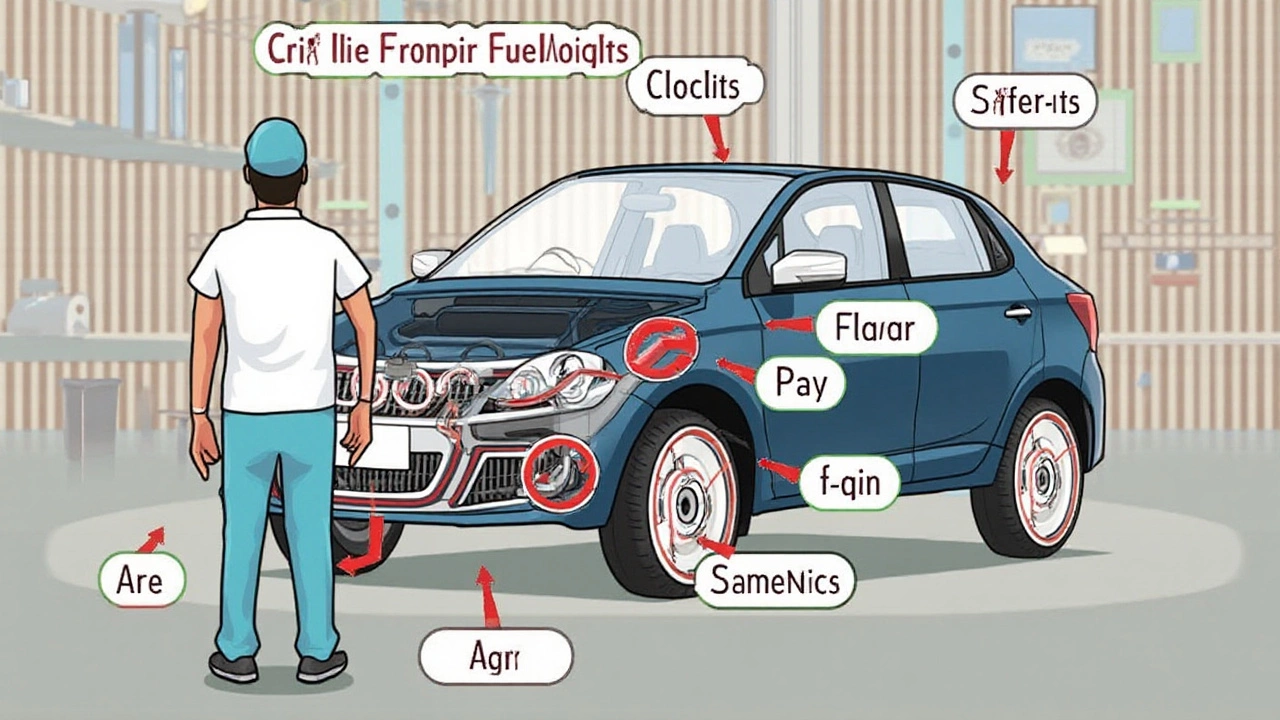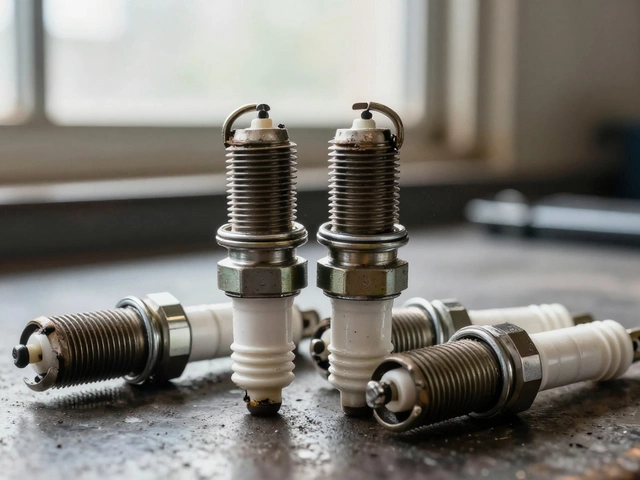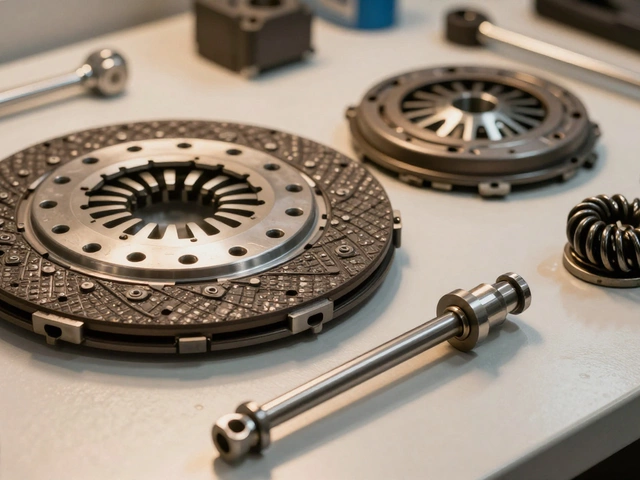
Fuel pumps serve as the heart of any vehicle's fuel system, pushing fuel from the tank to the engine. When they falter, it disrupts the entire rhythm, leaving drivers stranded and frustrated. Understanding why these pumps fail is the first step toward prevention and maintenance.
In this article, we'll delve into the most common reasons behind fuel pump issues, the warning signs that often precede complete failure, and some practical tips to keep your vehicle running smoothly. Whether you're a seasoned driver or new to car ownership, this guide will help you avoid unnecessary stress and costly repairs.
Join us as we navigate through the intricacies of fuel pumps, ensuring you stay ahead of potential problems and continue cruising comfortably.
- Introduction to Fuel Pumps
- Common Causes of Fuel Pump Failures
- Recognizing the Signs of a Failing Fuel Pump
- Prevention Tips for Car Owners
- When to Seek Professional Assistance
- Conclusion and Final Thoughts
Introduction to Fuel Pumps
Fuel pumps play a critical role in the automotive ecosystem, akin to the heart in the human body. They are tasked with the pivotal job of conveying fuel from the tank through lines, ensuring a steady supply to the engine. Without a working fuel pump, even the most powerful engines would simply stand still, lacking the fuel they need to ignite and operate. The genius of the fuel pump lies in its ability to manage this process seamlessly, maintaining optimal pressure levels with each stroke.
When exploring the types of fuel pumps, it's essential to acknowledge the distinction between mechanical and electric variants. Older vehicles, often classics from the mid-20th century, rely on mechanical pumps that are driven by the engine's rotation—quite an engineering marvel of their time. These pumps have a nostalgic charm but come with their own set of maintenance quirks. In contrast, modern vehicles predominantly utilize electric fuel pumps, typically submerged within the gas tank itself. This immersion serves a dual purpose: cooling the pump and helping it perform its role quietly and efficiently.
To understand the way a fuel pump functions adds layers of awareness for any car enthusiast or responsible owner. In performing their duties, these pumps create and sustain pressure to move fuel through a filter that captures impurities before reaching injectors in the engine. The controlled manner in which they operate is impressive. Most remarkably, according to a piece from
The Car Expert magazine states, "the efficiency of modern fuel pumps contributes significantly to advances in fuel economy standards across the globe."
While fuel pump technology has come a long way, it is not devoid of issues. Wear and tear over time is inevitable; however, immediate concerns often arise from contamination. Sediments and debris can hamper a pump’s function, highlighting the importance of clean fuel filters and routine checks. Another factor worthy of note is the dire consequence of running a vehicle consistently on low fuel, as it can lead to overheating—a frequent precursor to failure. Such understanding helps in preemptively safeguarding against these common pitfalls.
With insights into the workings and types of fuel pumps, appreciation for their engineering feats becomes evident. But with this understanding also comes the responsibility of ensuring that our fuel systems are well-maintained, allowing us to enjoy the drive without unwelcome surprises. Knowing the mechanics behind what propels our journeys fosters a deeper connection with our vehicles, intertwining human experience with automotive marvel.
Common Causes of Fuel Pump Failures
Fuel pumps are critical components located at the heart of your vehicle's fuel system, and when they fail, the results can be both distressing and costly. One of the most prominent causes of fuel pump failure is running your vehicle consistently on low fuel. When the fuel level is low, the pump operates without enough lubrication and cooling, potentially leading to overheating. Constant exposure to low-fuel conditions wears out the pump prematurely, paving the way for further complications down the line.
Contaminated fuel is another silent adversary. Tiny particles and debris within the fuel can enter the fuel system, leading to clogs that obstruct the pump’s operation. This contamination doesn't just happen overnight; it accumulates over time, gradually stifling the pump’s efficiency until, like a sieve filling slowly, it’s finally overwhelmed. Ensuring high-quality fuel and periodically checking and changing the fuel filter can significantly mitigate this risk.
Another notorious culprit is electrical issues, which are often overlooked. The fuel pump is part of a complex electrical circuit including relays, fuses, and wiring. Issues in any of these components can disrupt the flow of electricity to the pump, either damaging it or leading to sporadic failures. Regular checks of your vehicle’s electrical systems can help nip these problems in the bud. Car maintenance should never skip the scrutinization of these components.
The age of the vehicle is non-negotiable in its influence on fuel pump longevity. As vehicles age, wear and tear become evident across various components, fuel pump included. Elements such as the fuel tank may begin to rust, sending tiny flakes into the fuel stream, further clogging and stressing the pump. Owners of older vehicles should keep a vigilant eye on such indicators, as preemptive action may save both money and hassle.
"Regular maintenance is the key to a vehicle's longevity," says automotive expert John Miles, "and that is especially true for fuel pumps, which thrive on clean fuel and consistent use."
Ignoring warning signs can escalate minor issues into major problems over time. A weakened pump may still allow your car to run, albeit with diminished efficiency and increased noise. That dull whirring sound or sputtering on ignition are not signs to ignore but warning alarms for consultation with a professional. Understanding these common causes of engine issues places drivers in a better position to take proactive action, preventing roadside breakdowns.

Recognizing the Signs of a Failing Fuel Pump
Driving along the winding roads, your vehicle's performance speaks volumes about its health. Recognizing the symptoms of a failing fuel pump makes all the difference between a smooth ride and sitting idle by the roadside. When a car's lifeline starts showing stress, subtle hints can manifest through unusual engine behavior. For instance, one might experience a worrisome sputter or stutter when the engine is put under load, particularly during acceleration or uphill climbs. This hesitation points to erratic fuel delivery, a classic symptom of pump issues. Knowing this, it becomes clear that taking immediate action could prevent bigger problems down the line. Consistent stalling, especially during idle, is another red flag that warrants attention. The pump might struggle to maintain necessary pressure, causing the engine to cut out sporadically.
Listening closely to your car's sounds also sheds light on potential pump troubles. An unmistakable whirring noise emanating from the fuel tank area, even when the car is stationary, often signifies wear and tear. Like many mechanical components, when a fuel pump nears the end of its lifespan, it tends to become noisy. Noticing this change early can save valuable time and expense by addressing the issue before it escalates. Interestingly, a car's gauge can also provide vital clues. Rapid fluctuations in fuel economy, particularly if you're visiting the pump more frequently without a valid reason, could be indicative of inefficient fuel usage, potentially linked to pump malfunction.
"The road to understanding your vehicle lies in attentive listening and timely action," suggests renowned automotive expert James Sheffield. A vehicle with diminishing engine power, especially at higher speeds, might not maintain the pressure required for optimal performance.
Lastly, consider checking engine warning signals. Modern vehicles often have warning lights that illuminate if a problem within the fuel system is detected. These indicators should never be ignored; instead, act as prompts to investigate further. In some cases, you might notice a surge in engine temperature if the fuel pump is failing and causing the engine to run lean, highlighted by inadequate fuel delivery. Staying vigilant and paying close attention to these signals offers the best chance at maintaining a reliable and well-functioning vehicle.
Prevention Tips for Car Owners
Taking care of your fuel pump isn't just about avoiding breakdowns; it's about prolonging the life of your vehicle and enhancing performance. Regular maintenance and conscious driving can go a long way in preventing fuel pump failure. One of the most vital steps is ensuring that the fuel tank remains at least a quarter full because driving with low fuel can cause the pump to overheat. Cold temperatures exacerbate this issue, so being vigilant during winter is crucial.
It's also wise to keep an eye out for any contaminants. Dirty fuel is a silent enemy of pumps. Fuel filters, which are relatively easy and inexpensive to replace, should be in optimal condition to catch particles before they reach the pump system. If you’re not sure about the cleanliness of the fuel you’ve been using, consider purchasing from trusted petrol stations. In some regions, it's reported that gasoline can contain particulates which might sometimes clog up your fuel system eventually. Checking your fuel filter regularly can spare you from unwanted damage to the pump.
"The cost of prevention is far less than the cost of recurring repairs," warns a trusted automotive mechanic in the industry. Keeping a close eye on fuel quality is paramount."
Another tip is to simply listen to your car. Strange noises, such as whining or unsteady sounds, are often the first indications that the fuel pump might be struggling. Conduct regular check-ups to preemptively identify potential malfunctions; this means less downtime and more confidence each time you turn the ignition. Vehicle owners should keep up with recommended service intervals, where professional diagnostics can reveal potential stress points before they culminate into breakdowns.
Moreover, driving habits can influence the performance of your fuel pump. Frequent hard acceleration or abrupt braking not only wears on the pump but also other engine components. Smooth and steady driving is always recommended. Additionally, consistently parking on steep inclines and slopes can place the fuel at awkward angles, causing the pump to strain excessively. Over time, such practices may lead to wear and tear that could otherwise be minimized.
It's also beneficial to be aware of reputable mechanics and auto shops, ensuring that repairs and replacements use genuine parts, which aligns with manufacturer specifications. This helps in maintaining the pump's efficiency and extends its longevity. When debating whether to invest in more quality gasoline versus regular, remember that certain additives can improve engine performance and contribute to a cleaner fuel line, thus protecting the pump.
To summarize, dedicate some attention to your vehicle's maintenance routine. Combining these steps with an understanding of common failure indicators can prove useful. Delving into the specifics of your car model and reading available resources often sets apart proactive owners from those facing unexpected hiccups on the road. Take the time for preventive measures; the effort is negligible compared to the rewards of a reliable and enduring car.

When to Seek Professional Assistance
Even the most seasoned DIY car enthusiasts can find themselves stumped when it comes to diagnosing and fixing a fuel pump failure. Recognizing when it's time to bring in a professional mechanic not only saves time and money in the long run but also ensures that your vehicle receives the care it needs to continue performing at its best. But how do you know when you've reached that point?
One of the clearest indicators that it's time to consult a professional is when you consistently notice your vehicle exhibiting the symptoms of a failing fuel pump, such as sputtering engines, frequent stalling, or an unusual whining noise emanating from the fuel tank. While these can sometimes result from other issues, if you have ruled out common culprits like a dirty fuel filter or a blocked fuel line, it's prudent to seek expert advice. Mechanics have the necessary tools and diagnostic equipment to pinpoint the exact cause of the problem, which can be difficult to achieve with a home toolkit.
Apart from symptoms, you should also consider professional help when the vehicle's age and mileage come into question. Most fuel pumps are built to last about 100,000 miles. Thus, if your car is reaching or surpassing this mileage, proactive maintenance by a certified technician could catch issues before they become severe. Mechanics can offer insights into the overall health of your vehicle's fuel system and suggest appropriate preventative measures tailored to your needs.
Evaluating Repair Costs and Reliability
Another important aspect to consider is the cost-effectiveness of repair versus replacement. Fuel pumps can be expensive to replace, and the added labor costs escalate the final invoice. Receiving a detailed assessment from a qualified mechanic allows you to understand whether it's worth repairing the existing fuel pump or investing in a new part altogether. Their expertise can guide you on making an informed decision concerning reliability and long-term performance.
"Waiting until the fuel pump completely fails can lead to an array of additional costs, not to mention being stranded on the side of the road," notes industry expert James Thompson of Auto Mechanics Today.
Professional mechanics are also well-versed in the latest technology and diagnostic techniques, making them an invaluable resource in an industry that continually evolves. This advanced knowledge can be particularly significant if your car operates with a complex modern fuel system, such as a direct injection engine.
| Symptom | Suggested Action |
|---|---|
| Sputtering Engine | Inspect/filter replacement |
| Frequent Stalling | Diagnostic check required |
| Whining Noise | Possible pump replacement |
Ultimately, choosing to work with a professional mechanic when foundation knowledge points to a likely fuel system issue could prevent more severe problems from developing and afford peace of mind while ensuring road safety. Remember, addressing issues early with help from trained experts is not just an investment in the current performance of your vehicle, but also its longevity.
Conclusion and Final Thoughts
Maintaining your vehicle's health is not just about keeping it clean and shiny; it includes ensuring critical components like the fuel pump function correctly. Often underestimated, this humble piece of machinery is pivotal in making sure the right amount of fuel reaches the engine under the right pressure. Failure to pay attention to its needs can lead to unexpected and potentially dangerous situations on the road. Regular checkups, listening for unusual sounds, and paying attention to performance changes are simple habits that can help you identify any early warning signs of fuel pump failure.
One of the essential facts about fuel pump failure is its tendency to happen gradually. It rarely stops working all of a sudden; instead, it gives off subtle hints like a lazy start, unusual sputtering, or reduced fuel efficiency. Such symptoms can tell attentive drivers that it might be time to check the fuel system. A clog from debris or sediment is a common issue, and the best way to prevent it is by keeping the fuel tank over a quarter full and changing the fuel filter periodically.
Another often overlooked factor is the use of low-quality fuel, which can lead to premature wear and tear. Investing in good fuel not only improves performance but also extends the pump’s life. A professional mechanic's eye can also spot potential issues before they escalate. A routine inspection can include checking the electrical systems associated with the fuel pump too, since electrical issues can mimic or cause pump failures.
"Preventive maintenance might seem tedious, but it’s fundamentally necessary," says Sam Harper, an expert from the Auto Mechanics Institute. "By being proactive, you're saving yourself from the inconvenience and cost of surprise repairs."
Taking a proactive approach to maintaining your vehicle’s fuel pump doesn’t just ensure smoother rides; it offers peace of mind. Another piece of valuable advice is to be knowledgeable about your vehicle's specifications. Some manufacturers might have detailed steps and advice specific to their models regarding fuel system care. Leveraging such information can be beneficial in the long term.
Ultimately, understanding the ins and outs of your vehicle’s engineering can save you from not just monetary loss but also from the stress of breakdowns. With the right knowledge and a bit of attention, you can keep your vehicle safe and efficient. Remember, a healthy fuel pump is a cornerstone of a smoothly running engine, meaning happy trails are always just one start away. Safe travels!





